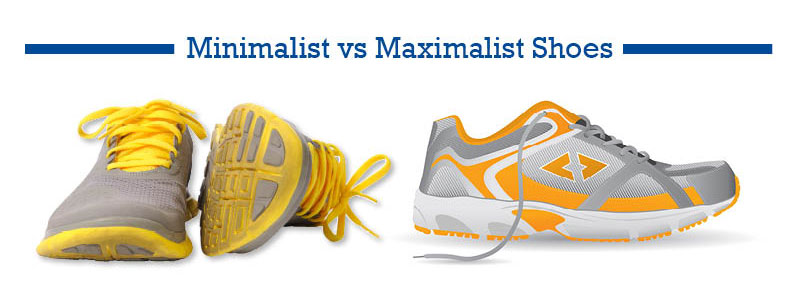
Minimalist Shoes vs. Maximalist Shoes
Leave a CommentWhat’s the best shoe to wear when running? Minimalist shoes, maximalist shoes, or your current running shoe? Here are some things to consider..
Is More Actually More?
Recently, you may have noticed larger soles on runners’ shoes. Brands like Hoka One One, Brooks, Saucony, Sketchers, and Karhu are creating a line of the maximalist shoe. The maximalist shoe adds extra cushioning to the sole which is up to 2.5 times the volume of a standard running shoe.
A few years ago, the new trend was a minimalist shoe trend. This trend to purchase shoes with the least amount of cushion was to allow your feet to feel the road and have the desired proprioception like when running barefoot.
So what’s the best shoe to wear when running: maximalist, minimalist, or your current running shoe? Here are some things to consider:
Minimalist Shoes:
Pros:
- If landing with more of a mid-foot strike (as opposed to heel), the knee is not stressed as much.
- Requires greater use and strength of the foot and ankle muscles.
Cons:
- It takes time to transition to wearing these shoes to avoid injury.
- If landing with a rear/heel foot strike, the knee and heel may be over stressed.
- Requires greater use and strength of the foot and ankle muscles.
Maximalist Shoes:
Pros:
- Additional shock absorption, especially for trail, downhill, and long distance (ultra) running.
- Some claim these shoes decrease quadriceps fatigue due to less knee flexion. This has not been proven.
Cons:
- Extra cushion may make some runners take harder landings than normal, likely from a hard heel strike pattern.
- Require less intrinsic foot strength, in which the foot and ankle may be working differently and changing your normal running technique.
- There is very little research backing up the pros and cons these shoes provide.
So, is the maximalist shoe just another trend? Although there are some good reasoning to start using the maximalist shoe, they still have not been around long enough to know how it affects the body long term.
Ultimately, you need a running shoe that is right for you. The “right” shoe feels comfortable, fits the structure of your body and running form, works well on the terrain you will be traversing, and is the correct size. Minimalist and/or maximalist shoes are not for every runner. If you are running well, not injured, and doing the mileage you want, don’t change a thing.
If you have any questions regarding your shoe wear and running, request an appointment at an Athletico Physical Therapy clinic near you and talk to an endurance specialist.
Click to Request an Appointment Today
The Athletico blog is an educational resource written by Athletico employees. Athletico bloggers are licensed professionals who abide by the code of ethics outlined by their respective professional associations. The content published in blog posts represents the opinion of the individual author based on their expertise and experience. The content provided in this blog is for informational purposes only, does not constitute medical advice and should not be relied on for making personal health decisions.
